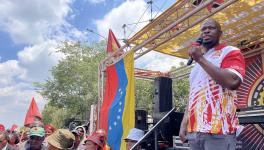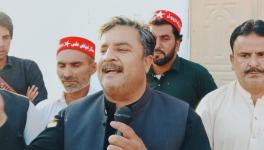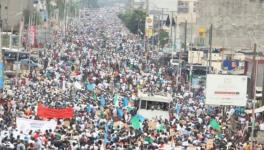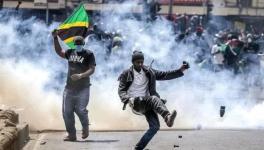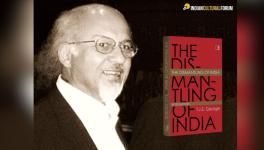Tanzania: Post-Poll Repression as Suluhu ‘Wins’ 97.66% Votes
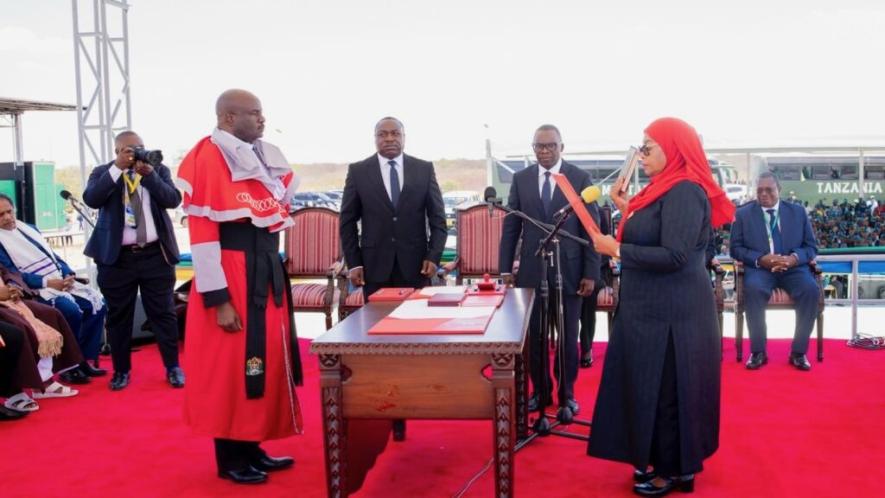
President Samia Suluhu Hassan is sworn in after re-election in Tanzania. Photo: X
The October 29, 2025, presidential elections in Tanzania plunged the country into its deepest political crisis in decades. President Samia Suluhu Hassan was declared the winner with an overwhelming 97.66% of the vote, a result widely denounced as fraudulent and surrounded by an atmosphere of repression, violence, and systematic silencing of dissent.
In the months leading up to the polls, opposition parties were systematically harassed. Rallies were disrupted, candidates were denied registration, and media outlets critical of the government faced suspension. The banning of CHADEMA leader Tundu Lissu from contesting and the arrest of dozens of party members prefigured an electoral process tightly controlled by the state apparatus.
In dialogue with Peoples Dispatch, Muhemsi says, this time round, the popular dissatisfaction was due to the issue of forced disappearances, abductions, as well as the “unfair” detention of some key opposition party leaders, especially Tundu Antipas Lissu, who is being charged with treason. His trial has been going on for months.
A nation under siege
What followed the disputed poll was a wave of protests in Tanzania’s recent history. Demonstrations erupted across major cities, from Dar es Salaam to Arusha and Mwanza, as citizens rejected the results. The government’s response was brutal. Under a nationwide curfew and a total internet shutdown, security forces unleashed a wave of violence against protestors. The opposition claims that thousands were killed or have disappeared, though independent verification remains impossible. Families continue to search for missing relatives, and many speak of a climate of fear and enforced disappearance.
Muhemsi described how Tanzanians have long been told that “no one would dare take to the streets”. The ruling Chama Cha Mapinduzi (CCM; “Party of the Revolution”), he said, has relied on the myth of Tanzania being an “Island of Peace” to suppress dissent. “Religious leaders were co-opted into spreading this ‘peace’ gospel, many of their events were literally organized if not funded by the state.”
Opposition leaders detained
In the aftermath, the government has intensified its repression. Hundreds of youth activists have been charged, and opposition leaders continue to face persecution. CHADEMA’s deputy secretary-general, Amani Golugwa, was arrested on November 8 and charged with treason, joining his party leader Tundu Lissu, who was barred from participating in the election and remains imprisoned. Other activists, youths, and human rights defenders have been detained under vague accusations of incitement and subversion.
The president’s inauguration, held behind closed doors, only deepened public outrage at a process that lacks legitimacy. A ceremony, symbolic of a government increasingly disconnected from its people.
Regional and continental reactions
Initially, regional and international reactions followed the pattern of complicity and silence that has long accompanied authoritarian consolidation in Africa. The African Union (AU) was quick to congratulate President Suluhu on her victory, a move that provoked widespread condemnation across the continent. In a reversal, the AU later, after sustained criticism, acknowledged that the elections “had not met the threshold of free and fair democratic values.”
In a statement, the African Commission on Human and Peoples’ Rights expressed “deep concern” over the situation, citing grave violations of the African Charter on Human and Peoples’ Rights, which Tanzania ratified in 1984. The Commission condemned reports of mass killings, arbitrary arrests, and the use of live ammunition against peaceful demonstrators, urging the government to “de-escalate the prevailing situation” and investigate the alleged atrocities.
The Commission further called on Tanzania to sign and ratify the “African Charter on Democracy, Elections, and Governance”, emphasizing the need for regular, transparent, and impartial elections – an implicit rebuke of the current regime’s conduct.
Similarly, the Southern African Development Community (SADC), through its Electoral Observation Mission, issued a preliminary report on November 3 stating that the poll fell short of democratic standards. The mission detailed harassment of its own observers, including an incident in Tanga, where security officers seized passports, interrogated monitors, and deleted photographs.
The ongoing repression not only erodes Tanzania’s internal democratic fabric but also threatens to destabilize the wider East African region, where social unrest and economic inequality have become combustible forces.
But despite these condemnations, no tangible measures have followed. The crisis in Tanzania exposes the limits of regional institutions, whose dependence on member states makes them reluctant to call out offending regimes. In effect, regional diplomacy has become the velvet glove around the iron fist of repression, completely detached from the aspirations of the majority of African people.
For Tanzanians, the current moment is one of mourning and resistance. As families continue searching for missing loved ones and opposition leaders and arrested protesters languish in detention. The overwhelming margin of victory – 97.66% – does not symbolize national unity but its absence. Muhmesi concludes that “CCM’s tragedy isn’t just staying in power; it’s that it long abandoned the task of leading Tanzanians away from capitalism. Until we face that truth, there can be no real democracy, no good constitution, because capitalism itself is the constitution of our suffering.”
Courtesy: Peoples Dispatch
Get the latest reports & analysis with people's perspective on Protests, movements & deep analytical videos, discussions of the current affairs in your Telegram app. Subscribe to NewsClick's Telegram channel & get Real-Time updates on stories, as they get published on our website.









